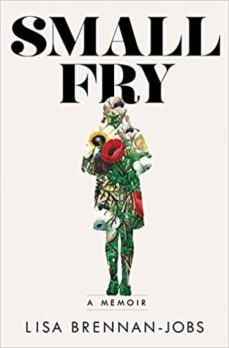Lisa Brennan-Jobs paints a rich portrait of her childhood, alternating between a mother barely able to support herself and a father almost pathologically distant. It’s a heartbreaking memoir, beautifully rendered.
“Small Fry”
by Lisa Brennan-Jobs
Grove Atlantic, 381 pp.
Steve Jobs was, beyond question, brilliant. He transformed the computer industry, launching Apple from ashes to the most valuable company in the world. But like so many intense, creative and successful people, his private life was just a bit more complicated.
Jobs had a daughter with artist Chrisann Brennan. For years Jobs largely ignored both Chrisann (they never married) and his daughter, Lisa Brennan-Jobs, denying paternity. For Lisa, Steve Jobs was more of a myth than a presence. When he did show up — to take her skating, or for an impromptu hike across the Golden Gate Bridge — Jobs was often cold and distant.
As she grew older, her father took an interest in her and she moved into his enormous but famously spartan house. But even then she was left feeling she was an outsider looking in on her father’s wife and their three children.
In “Small Fry,” Brennan-Jobs paints a rich portrait of her childhood, alternating between a mother barely able to support herself and a father almost pathologically distant. It’s a heartbreaking memoir, beautifully rendered. Jobs’ success at Apple and Pixar are distant muffled echoes; this is an intimate story about family and family dysfunction.
There is no licensing requirement to have a child and, while some parents are naturally great parents, others struggle to provide their children with warmth, support and encouragement. Fortunately, children are resilient and most can rise above whatever their parents were unwilling or unable to provide. But however one might measure the quality of a parent, Jobs would surely not score terribly high. Petty, thin-skinned and vindictive, he would refuse to say good night to his 14-year-old daughter, even when she all but begged for the attention. He repeatedly denied having named the famous Apple “Lisa” computer after his daughter (only finally admitting the obvious late in life when Bono asked him). He refused to fix the heating in her bedroom. He refused to pay her college tuition her senior year at Harvard, leaving it to kindly neighbors to fund it — only later repaying them.
The initial press accounts of Brennan-Jobs’ memoir focused attention on these moments of indifference or cruelty, reinforcing the popular perception that Steve Jobs was the self-centered and cruel genius portrayed in Walter Isaacson’s biography “Steve Jobs.”
And perhaps he was. But with all due respect, that misses the central point of Brennan-Jobs’ book. This isn’t an attack on a distant and emotionally cold father. It’s a love story for the father that she had, flaws and all, and a recognition that he, too, knew he had failed her and burned with regret. Yes, as widely reported, in one of their last encounters, he told her that she “smelled like a toilet.” But, as she recounts, she had recently applied an organic perfume that degraded quickly, something she had not realized. And he made the comment only after a long and loving hug. It was not a cruel insult; it was truth from someone who saw that as a gift, not a slap.
Brennan-Jobs describes how she attended her much younger sister’s birthday party and, while passing through the kitchen, noticed honey jars with labels containing five illustrations of bees with the names of the family members written beneath each of them — but not including her. It hurt, but then she had a moment of revelation. “It was irrelevant that I wasn’t named on the honey pots. I had not been a mistake. I was not the useless part of something meaningful … I wouldn’t trade any part of my experience for someone else’s life, I felt then, even the moments where I’d wished I didn’t exist, not because my life was right or perfect or best but because the accumulation of choices made had carved a path that was characteristic and distinct, down to the serif, and I felt the texture of it all around me for just a moment, familiar, like my own skin and it was good enough.”
Brennan-Jobs’ memoir is a wise, thoughtful and ultimately loving portrayal of her father, who fell far short of ideal but somehow helped to raise an intelligent, perceptive and forgiving young woman. And that surely must rank as Steve Jobs’ most improbable accomplishment.
